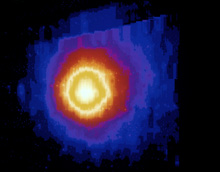Soooh, you like to lay out in your easy chair and watch the sky at night
for shooting stars.
There goes one, whizzing by in a streak of light.
Any chance of doing you damage?
Probably not because they are just small flakes that burn up in the the
Earth's atmosphere.
OK, you are pitching your vacuum sealed tent on the Moon and preparing
to scoop some regolith over its top to help protect you from the Solar
rays, Coronal Mass Ejections, a few Gamma Ray bursts and a general
background radiation that is a bit higher than normal.
What about watching a light show from the debris from your local
asteroid break up that you are now plowing through?
Check out the story below.
- LRK -
---------------------------------------------------------------
NASA Science News for May 21, 2008
NASA astronomers have been watching the Moon to see how often meteoroids
crash into the lunar surface and they've just video-recorded their 100th
explosion. This surprisingly bountiful data-set allows researchers to
start drawing conclusions about when, where, and how often the Moon gets
hit.
FULL STORY at
http://science.nasa.gov/headlines/y2008/21may_100explosions.htm?list965414
Check out our RSS feed at http://science.nasa.gov/rss.xml!
<http://science.nasa.gov/rss.xml%21>
snip
---------------------------------------------------------------
Thanks for looking up with me. Did you see that!?
Larry Kellogg
Web Site: http://lkellogg.vttoth.com/LarryRussellKellogg/
BlogSpot: http://kelloggserialreports.blogspot.com/
RSS link: http://kelloggserialreports.blogspot.com/atom.xml
Newsletter: https://news.altair.com/mailman/listinfo/lunar-update
==============================================================
http://science.nasa.gov/headlines/y2008/21may_100explosions.htm?list965414
100 Explosions on the Moon
*May 21, 2008:* Not so long ago, anyone claiming to see flashes of light
on the Moon would be viewed with deep suspicion by professional
astronomers. Such reports were filed under "L" � for lunatic.
Not anymore. Over the past two and a half years, NASA astronomers have
observed the Moon flashing at them not just once but /one hundred/ times.
"They're explosions caused by meteoroids hitting the Moon," explains
Bill Cooke, head of NASA's Meteoroid Environment Office at the Marshall
Space Flight Center (MSFC). "A typical blast is about as powerful as a
few hundred pounds of TNT and can be photographed easily using a
backyard telescope."
As an example, he offers this video of an impact near crater Gauss on
January 4, 2008:
Snip
During meteor showers such as the Quadrantids or Perseids, when the Moon
passes through dense streams of cometary debris, the rate of lunar
flashes can go as high as one per hour. Impacts subside when the Moon
exits the stream, but curiously the rate /never goes to zero/.
"Even when no meteor shower is active, we still see flashes," says Cooke.
Snip
Secondary impacts are the greater concern. When meteoroids strike the
Moon, debris goes flying in all directions. A single meteoroid produces
a spray consisting of thousands of "secondary" particles all traveling
at bullet-like velocities. This could be a problem because, while the
odds of a direct hit are low, the odds of a secondary hit may be
significantly greater. "Secondary particles smaller than a millimeter
could pierce a spacesuit," notes Cooke.
Snip
"The Moon is still flashing," says Suggs. Indeed, during the writing of
this story, three more impacts were detected.
New title: /103 Explosions on the Moon/.
Stay tuned to Science@NASA for a follow-up story describing how amateur
astronomers can participate in this research.
snip
==============================================================
WHAT THE MIND CAN CONCEIVE, AND BELIEVE, IT WILL ACHIEVE - LRK
==============================================================
Many folks would like to see us back on the Moon and developing its resources.
Wednesday, May 21, 2008
Subscribe to:
Post Comments (Atom)





No comments:
Post a Comment
Note: Only a member of this blog may post a comment.